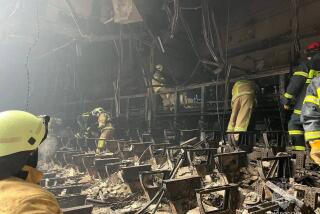Islamic State attacks Iraq’s oil-rich northern city of Kirkuk
Islamic State militants launched a multi-pronged attack Friday on the northern Iraqi oil hub of Kirkuk, seizing a downtown building and attacking at least three points along the city’s defensive perimeter, authorities said.
Iraqi Kurdish forces said they had beaten back the assault, but a well-known commander of the Kurdish peshmerga, Brig. Gen. Sherko Shwani, was among at least seven Kurdish fighters reported killed in fighting in and around the city. Dozens of militants were reported killed in the various attacks.
The Islamic State strike came as the extremist group has suffered a series of battlefield setbacks in Iraq and neighboring Syria, puncturing the indomitable image that the group has tried to project.
The militants this week retreated from the northern Syrian city of Kobani after failing to overrun the Kurdish-controlled town on the border with Turkey.
In northern Iraq, Kurdish forces have been steadily closing in on the city of Mosul, an Islamic State stronghold. Some speculated that Friday’s attacks on Kirkuk may have been an effort to divert or stretch Kurdish manpower.
Several Islamic State attacks were also reported Friday on Kurdish positions south and east of Mosul. The Kurdish news site Rudaw reported that heavy fog had prevented deployment of aircraft from the U.S.-led coalition that has been bombing extremist positions for months.
Kurdish reinforcements were reportedly being rushed to Kirkuk, a long-contested city in the middle of an oil-rich stretch of Iraq.
Forces from Iraq’s semi-autonomous Kurdish region swept into Kirkuk last year when Iraqi government troops retreated in the face of a rapid Islamic State advance through northern and western Iraq. The Kurds hold a more than 600-mile front-line against Islamic State units.
Kirkuk is vulnerable to attack from sleeper cells in the city and militant positions just a few miles way, Kurdish officials say. Islamic State covets the city for its oil riches and its symbolic significance to Iraqi Arabs, who dispute Kurdish claims on Kirkuk.
Friday’s attack featured a dramatic militant takeover of the former Kirkuk Palace Hotel, preceded by the explosion of a car bomb outside the centrally located structure, which has been vacant for years. Footage from the scene showed Kurdish forces firing from the street into the six-story hotel and climbing into the building as militants emptied rounds from their perches.
Kurdish fighters stormed the hotel and killed four attackers, said Ferhad Hama, police spokesman in Kirkuk. All were wearing suicide belts, he said. The militants wanted to set up sniper positions and fire on the city, the spokesman said.
“Their intention was to control the center of Kirkuk and create chaos there,” said Hama, speaking by telephone.
Kurdish authorities have been concerned about Islamic State sleeper cells within Kirkuk, which has a mixed population including Kurds, Sunni Arabs and Christians. The city has also absorbed tens of thousands of people displaced in fighting elsewhere.
In the pre-dawn hours Friday, authorities said, Islamic State fighters, under cover of inclement weather, attacked Kurdish lines to the south, southwest and east of Kirkuk, resulting in fierce gun battles. The various assaults appear to have been coordinated, Kurdish authorities say.
Shwani, who was the commander of the 1st Peshmerga Brigade, was a familiar figure to many as he was often interviewed in television reports from the front line.
Iraqi officials called the assault on Kirkuk a sign of Islamic State’s desperation as its momentum has been halted.
“It comes as a cover for the successive defeats that have befallen the terrorist Daesch organization,” Salim al-Jaboori, head of the Iraqi Parliament, told Iraqi state television, using the Arabic acronym for Islamic State.
To the east, in Iraq’s Diyala province, the Kurdish press reported that seven peshmerga troops were killed in a suicide attack in the township of Jalawla, close to the Iranian border. Iraqi government forces said this week that they had chased most Islamic State forces from Diyala province, long a flash-point for sectarian-fueled violence.
Elsewhere in Iraq, a pair of bombs exploded Friday in Baghdad’s Bab al-Sharqi district, home to a large market and shopping distict. A local media outlet, al-Sumariyah News, reported 44 dead and 70 wounded in the twin attacks.
Islamic State militants have been conducting a regular bombing campaign in the capital, often targeting Shiite neighborhoods. Islamic State is a radical Sunni organization that views Shiites, the majority sect in Iraq, as apostates.
Times staff writer McDonnell reported from Beirut and special correspondent Bulos from Amman, Jordan.
Twitter: @mcdneville
More to Read
Start your day right
Sign up for Essential California for news, features and recommendations from the L.A. Times and beyond in your inbox six days a week.
You may occasionally receive promotional content from the Los Angeles Times.






